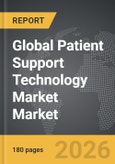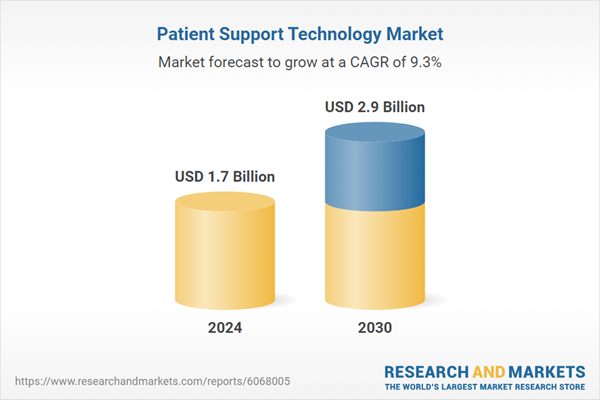Global Patient Support Technology Market - Key Trends & Drivers Summarized
Is Technology Reshaping Patient Care? The Rise of Digital Support Solutions in Healthcare
The healthcare industry is experiencing a fundamental shift towards digital transformation, and patient support technology is at the forefront of this evolution. As healthcare providers strive to enhance patient experience, reduce hospital readmissions, and improve clinical outcomes, technology-driven support systems are becoming indispensable. Patient support technology encompasses a wide range of innovations, including interactive patient engagement platforms, AI-powered chatbots, mobile health (mHealth) applications, remote assistance tools, and virtual healthcare assistants. These technologies are designed to empower patients with real-time information, self-care guidance, and seamless communication with healthcare providers. Hospitals and clinics are increasingly integrating digital patient support tools into their care delivery models to ensure continuous monitoring, education, and adherence to treatment protocols. With the rise of telemedicine and hybrid care models, patient support technology is playing a crucial role in bridging the gap between healthcare professionals and patients, ensuring better access to care. As the demand for personalized healthcare experiences grows, patient support technologies are becoming more sophisticated, incorporating artificial intelligence (AI), machine learning, and natural language processing to provide tailored recommendations and proactive healthcare interventions.How Is AI and Automation Enhancing Patient Support Systems? A New Era of Intelligent Healthcare
Artificial intelligence (AI), automation, and cloud-based platforms are revolutionizing patient support technology by enhancing accessibility, efficiency, and personalized care. AI-powered virtual assistants and chatbots are transforming the way patients interact with healthcare providers, offering instant answers to medical queries, appointment scheduling, and medication reminders. Machine learning algorithms are improving patient adherence by analyzing behavioral patterns and providing personalized nudges for follow-up care. Remote monitoring systems equipped with AI analytics can detect early warning signs of health deterioration, allowing for timely interventions and reducing emergency hospitalizations. Cloud-based patient support platforms are ensuring seamless integration of electronic health records (EHRs) with real-time patient data, enabling healthcare professionals to provide informed and data-driven decisions. Voice recognition and natural language processing (NLP) technologies are making patient interactions with digital support tools more intuitive and user-friendly, particularly for elderly and disabled patients. Automation in patient support technology is streamlining administrative tasks such as insurance verification, billing support, and post-discharge follow-ups, allowing healthcare providers to focus more on patient care. As AI and automation continue to advance, patient support systems are evolving into intelligent, predictive, and highly interactive healthcare solutions.Who Is Driving the Adoption of Patient Support Technology? The Expanding Market Across Sectors
The adoption of patient support technology is expanding across hospitals, outpatient clinics, home healthcare providers, pharmaceutical companies, and telemedicine platforms. Hospitals are implementing interactive patient engagement tools to improve patient education, reduce readmissions, and enhance recovery outcomes. Home healthcare providers are leveraging remote support technologies, including telemonitoring and virtual nursing assistants, to manage chronic diseases and post-operative care effectively. Pharmaceutical companies are integrating digital support programs to assist patients in medication adherence, clinical trial participation, and real-world evidence collection. Telemedicine platforms are using AI-driven patient support chatbots and symptom checkers to enhance virtual consultations and triage patients effectively. Insurance companies are increasingly investing in digital patient support tools to monitor patient wellness, reduce claim costs, and encourage preventive healthcare. Wearable device manufacturers are embedding AI-powered support features to provide users with real-time health insights, coaching, and condition management recommendations. The growing popularity of personalized and value-based healthcare models is further accelerating the adoption of patient support technologies across multiple sectors.The Growth in the Patient Support Technology Market Is Driven by Several Factors…
The increasing shift toward patient-centric care models is a key driver of growth in the patient support technology market. The rising adoption of AI-powered digital health tools and remote monitoring solutions is fueling demand for intelligent patient support systems. The expansion of telehealth and virtual care services is accelerating the need for interactive support technologies that enhance remote patient engagement. The growing burden of chronic diseases, coupled with an aging global population, is driving the demand for continuous and personalized patient support solutions. Regulatory mandates promoting digital health adoption, such as the Health Information Technology for Economic and Clinical Health (HITECH) Act and GDPR, are compelling healthcare providers to integrate advanced patient support tools. The integration of wearable health technology with AI-driven patient engagement platforms is enhancing real-time monitoring and self-care. The increasing focus on medication adherence and treatment compliance is pushing pharmaceutical companies to invest in digital support solutions that assist patients in managing their conditions effectively. The demand for multilingual and culturally adaptive patient support tools is rising, enabling healthcare providers to offer more inclusive and accessible care. Strategic collaborations between tech companies, healthcare providers, and insurance firms are driving innovations in patient support technologies. As healthcare continues to embrace digital transformation, patient support technology is set to redefine care delivery, ensuring a more interactive, efficient, and patient-centric future.Report Scope
The report analyzes the Patient Support Technology market, presented in terms of market value (US$). The analysis covers the key segments and geographic regions outlined below:- Segments: Type (Standalone, Integrated).
- Geographic Regions/Countries: World; United States; Canada; Japan; China; Europe (France; Germany; Italy; United Kingdom; Spain; Russia; and Rest of Europe); Asia-Pacific (Australia; India; South Korea; and Rest of Asia-Pacific); Latin America (Argentina; Brazil; Mexico; and Rest of Latin America); Middle East (Iran; Israel; Saudi Arabia; United Arab Emirates; and Rest of Middle East); and Africa.
Key Insights:
- Market Growth: Understand the significant growth trajectory of the Standalone Patient Support segment, which is expected to reach US$1.8 Billion by 2030 with a CAGR of a 8%. The Integrated Patient Support segment is also set to grow at 11.7% CAGR over the analysis period.
- Regional Analysis: Gain insights into the U.S. market, valued at $462.3 Million in 2024, and China, forecasted to grow at an impressive 12.5% CAGR to reach $577.9 Million by 2030. Discover growth trends in other key regions, including Japan, Canada, Germany, and the Asia-Pacific.
Why You Should Buy This Report:
- Detailed Market Analysis: Access a thorough analysis of the Global Patient Support Technology Market, covering all major geographic regions and market segments.
- Competitive Insights: Get an overview of the competitive landscape, including the market presence of major players across different geographies.
- Future Trends and Drivers: Understand the key trends and drivers shaping the future of the Global Patient Support Technology Market.
- Actionable Insights: Benefit from actionable insights that can help you identify new revenue opportunities and make strategic business decisions.
Key Questions Answered:
- How is the Global Patient Support Technology Market expected to evolve by 2030?
- What are the main drivers and restraints affecting the market?
- Which market segments will grow the most over the forecast period?
- How will market shares for different regions and segments change by 2030?
- Who are the leading players in the market, and what are their prospects?
Report Features:
- Comprehensive Market Data: Independent analysis of annual sales and market forecasts in US$ Million from 2024 to 2030.
- In-Depth Regional Analysis: Detailed insights into key markets, including the U.S., China, Japan, Canada, Europe, Asia-Pacific, Latin America, Middle East, and Africa.
- Company Profiles: Coverage of players such as 1upHealth, Accenture, AllazoHealth, AssistRx, Cardinal Health and more.
- Complimentary Updates: Receive free report updates for one year to keep you informed of the latest market developments.
Some of the 42 companies featured in this Patient Support Technology market report include:
- 1upHealth
- Accenture
- AllazoHealth
- AssistRx
- Cardinal Health
- Change Healthcare (Optum)
- Deloitte
- DrChrono
- GetWellNetwork
- Inizio Engage
- IQVIA
- Lyniate
- McKesson Corporation
- Medisafe
- naviHealth
- PatientPoint
- Press Ganey
- Solutionreach
- Verint Systems
- Wolters Kluwer Health
This edition integrates the latest global trade and economic shifts into comprehensive market analysis. Key updates include:
- Tariff and Trade Impact: Insights into global tariff negotiations across 180+ countries, with analysis of supply chain turbulence, sourcing disruptions, and geographic realignment. Special focus on 2025 as a pivotal year for trade tensions, including updated perspectives on the Trump-era tariffs.
- Adjusted Forecasts and Analytics: Revised global and regional market forecasts through 2030, incorporating tariff effects, economic uncertainty, and structural changes in globalization. Includes historical analysis from 2015 to 2023.
- Strategic Market Dynamics: Evaluation of revised market prospects, regional outlooks, and key economic indicators such as population and urbanization trends.
- Innovation & Technology Trends: Latest developments in product and process innovation, emerging technologies, and key industry drivers shaping the competitive landscape.
- Competitive Intelligence: Updated global market share estimates for 2025, competitive positioning of major players (Strong/Active/Niche/Trivial), and refined focus on leading global brands and core players.
- Expert Insight & Commentary: Strategic analysis from economists, trade experts, and domain specialists to contextualize market shifts and identify emerging opportunities.
Table of Contents
Companies Mentioned (Partial List)
A selection of companies mentioned in this report includes, but is not limited to:
- 1upHealth
- Accenture
- AllazoHealth
- AssistRx
- Cardinal Health
- Change Healthcare (Optum)
- Deloitte
- DrChrono
- GetWellNetwork
- Inizio Engage
- IQVIA
- Lyniate
- McKesson Corporation
- Medisafe
- naviHealth
- PatientPoint
- Press Ganey
- Solutionreach
- Verint Systems
- Wolters Kluwer Health
Table Information
| Report Attribute | Details |
|---|---|
| No. of Pages | 180 |
| Published | January 2026 |
| Forecast Period | 2024 - 2030 |
| Estimated Market Value ( USD | $ 1.7 Billion |
| Forecasted Market Value ( USD | $ 2.9 Billion |
| Compound Annual Growth Rate | 9.3% |
| Regions Covered | Global |









